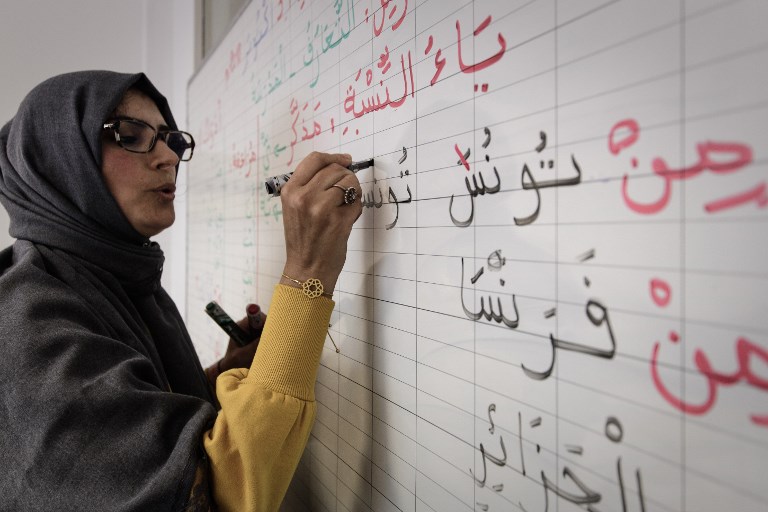More than 270 million people speak Arabic across the globe. Given its universal importance, this language is definitely worth learning. However, this process can seem challenging and Arabic learners try to find tips for learning Arabic to make it easier and more effective.
Fortunately, there is an easier way of reaching fluency in this language if you follow some key tips and suggestions. This will not only teach you how to learn Arabic but will also provide you with the best way of reaching fluency. So, if you have any concerns like how long will it take to learn Arabic fluently or how hard is it to learn Arabic from English, continue reading this post. We have covered many fruitful tips for learning Arabic!
Table of Contents
Tips for Learning Arabic Language Fast
Learning Arabic, just like any other language, is not a piece of cake. It is a complete process and an amazing journey to take. With some effective tips and tricks, you can learn the language of the Quran in an amazingly faster way. Following are the eleven main tips for learning Arabic:
1. Pick the Right Form of Arabic
We can mainly divide the Arabic language into 3 versions: Modern Standard Arabic, classical Arabic, and colloquial Arabic. MSA, or Fusha, is generally used in mass media, law, literature… etc. It is not generally spoken as a first language in Arab countries because every country has developed a special dialect (colloquial Arabic). Plus, it is more comfortable to speak than the other version with no difficult words in it. This type also has no tongue-twisting words or phrases that could easily confuse a beginner-level Arabic speaker.
Classical Arabic, on the other hand, is a more refined form of language full of difficult words and demands great understanding in the beginning. It is similar to formal English, which is more often used in research studies and business tasks.
Figuring out the right type of Arabic to learn would make learning faster. So, it is important to focus on a single class and avoid confusion between different types. Broadly speaking, it is better to learn MSA since this type is easier to learn and commonly understood in Arabic nations.
In addition, learning the Arabic language is a challenging task as it needs the learning of new words and experience to become perfect. In order to achieve this, it is ideal to commit to a dialect also while figuring out the basics. You would need to select a dialect and bring it to perfection. However, most importantly, you need to follow that particular dialect and not mix it up with others. Next is to find a dialect that is commonly used in a specific country. It is totally up to you and the country to pick the dialect selection and perfection.
2. Begin with the Basics
Now, here is another tip on how to learn Arabic for beginners. Understandably, people, in the beginning, fall into the snare of attempting to learn Arabic by interpreting words rather than learning the basics of the language. This is mainly because the characters may appear unfamiliar, which increases the temptation to cut corners and start learning the language by simply transcribing the words. However, this is certainly not the right approach.
Remember how we learned English back in school? It starts with getting familiar with the alphabet, followed by structuring those letters into words. After, you figure out how to structure sentences, and finally, study the logical frames and punctuation of the language. If you take any alternates, it will only back you off the learning process.
Similar to other languages, Arabic starts with the alphabet. Here are some facts about it:
- All letters stand for a consonant or a long vowel.
- Different letters change their form based on the place they have in the word.
- Short vowels are defined with certain vowel marks.
- A few letters are always joined both in the handwritten and printed alphabet.
Also, there are just 28 letters in the Arabic language.
Below are all of them to help you get started, along with their approximate pronunciation in English:
| ا A – Alif | ب B – Ba | ت T – Ta | ث Tha – Tha | ج J – Jim | ح H – Ha | خ KH – Kha |
| د D – Dal | ذ TH – Dhal | ر R – Ra | ز Z – Za | س S – Sin | ش SH – Shin | ص S – Sad |
| ض Da – D’ad | ط DH – Dha | ظ Tha- Dh’a | ع A – ‘Ain | غ GH – Ghain | ف F – Fah | ق Q – Qaf |
| ك K – Kaf | ل L – Lam | م M – Mim | ن N – Nun | ه H – Ha | و W – Waw | ي Y – Yah |
3. Learn How to Read Arabic
The most difficult part about reading Arabic is remembering that some of all letters change their form in different positions. Many of the letters appear similar but are different from one another by dots like the letters. To read these well in Arabic, it is important to master these letters and know exactly which sounds they make.
4. Learn How to Write Arabic
Arabic texts are written from right to left in a cursive manner. This indicates that each letter is connected and flows into the other. Though there are no lower or uppercase letters in this language, the shapes of letters create this flow based on their position in the word. Following are some tips for learning Arabic, in addition to writing, in a proper manner:
- Don’t lift the pen when writing – move it smoothly from one letter to another with no interruption.
- Practice often.
- Control the movement of your fingertips and write all letters repeatedly while paying attention to the finest details.
- Keep writing from right to left to develop new muscle memory.

5. Learn How to Speak Arabic
Writing and reading aren’t enough with any language – speaking a foreign language is equally important. The Arabic language is full of different and difficult sounds. These are not present in English, but you can learn them, of course. Of all the useful tips for learning Arabic fast, the ultimate one is to practice a lot.
Mostly, it is the last part of many language learners’ practice. Maybe they are not really confident about speaking a foreign language in front of others. So, never let language learning anxiety limit you. Start speaking from the first lesson to achieve fluency. Converse in Arabic with others. Use online platforms to speak freely with the natives and get feedback on your performance.
Also, check this out for more fruitful tips to speak Arabic like natives.
6. Immerse Yourself in Arabic Culture
Immersing yourself in the culture is a crucial step in learning any language, but doubly when that language is Arabic. Here are some practice tips for learning Arabic effectively:
- Learn About Arabic Customs and Traditions – Akin to all other cultures existing on the face of the earth, Arabic culture has many traditions that are simply fascinating to learn about.
- Watch Arabic YouTube Channels – We all know that being free is the best part of YouTube. And there are loads of Arabic YouTubers who are uploading their online content to teach their native language. Listen to their Arabic while you stream their videos.
- Watch Arabic TV Channels – Watching TV shows and movies is among the most effective ways of learning a language. So, it is ideal to begin with watching children’s TV programs in Arabic as the vocabulary is basic, and the educational nature of those shows can be of great help to beginners. Another way to gain a better ear for listening is to watch movies in Arabic with English subtitles on.
- Listen to Arabic News – It works great if you want to learn a language. As a matter of fact, many research studies have proved that people who listen a lot while learning a language perform better than those who don’t. Hearing the rhythm and melody of the language while trying to speak works excellently.
- Join an Arabic Community – Online communities are great for connecting with people who want to learn the same thing as you do. Joining Arabic online communities with natives will help you learn daily-life words and sentences.
- Chat with Arabs – The most effective way of getting started is to communicate with native Arab speakers. Simply chat with them – ask questions, discuss different everyday topics, or make comments.
7. Set Progress Milestones
Many people ask, ‘Can you learn Arabic by yourself?’ To be successful in learning Arabic within a short duration, it is important to set some progress milestones. Begin with defining primary objectives and achieving them within the set time limit. It will help you prepare your lessons timely. In addition, you should set a milestone to track your progress and motivate yourself. Albeit quite simple in nature, all these milestones will make it easy to learn the Arabic language.
8. Learn to Use the Arabic Dictionary
In general, Arabic dictionaries have words categorized around three-letter roots. To search for a word, you must know what the root (origin) is and what letter the root begins with. This is not always the starting letter in the word.
The use of a dictionary requires practice, but the sooner you learn it, the better. It will make the whole process easier and more enjoyable. Here is a list of 5 useful online and offline Arabic dictionaries.

9. Perform Daily Practice
The practice of a language is important to improve your skills and build confidence. Choose a preferred schedule to stay in the flow. Spare some time every day just to learn new vocabulary and grammar rules. Having an immense vocabulary can give you a great advantage.
Common Phrases to Practice in Arabic:
Greetings
- Hello – Marhaba (مرحبا)
- Bye – Salaam (سلام)
- Good morning – Sabah Al Kheyr (صباح الخير)
- Good evening – Masa Al Kheyr (مساء الخير)
- Goodbye – Ma’a salaama (مع السلامة)
- How are you – Kaifa Halak (كيف حالك)
- I am fine, thanks – Ana Bikheyr, Shukran (أنا بخير شكرا)
- You’re welcome – Afwan (عفواً)
- My name is … – Ana Ismii … (أنا إسمى)
Small Talk
- Yes – Na’am (نعم)
- No – La (لا)
- Okay – Na’am (نعم)
- Please – Min fadlik (من فضلك) or Arjuuk (أرجوك)
- Sorry – Aasif (آسف)
- Excuse me – Low Samaht (لو سمحت)
- I don’t know – Ana la a’rif (أنا لا أعرف)
- I don’t understand – Ana la afham (أنا لا أفهم)
- I don’t speak Arabic – Ana la atakalam al Arabiya (أنا لا أتكلم العربية)
10. Purchase a Good Arabic Language Book
Reading is one of the great tips for learning Arabic. Speaking of the Arabic language, it helps you get an understanding of Arab history and culture, in addition to developing your vocabulary. If you are, due to any reason, unable to visit an institution, several books are available in the market and on the Internet that can be used to learn Arabic to a greater extent.
Most of the books are written by prominent Islamic universities, so there is absolutely no chance of having any errors in the copy. Many books also are budget-friendly, so people from every stratum can afford to purchase these books. However, make sure that the author of the book is a native Arabic speaker.
11. Learn with a Professional Arabic Teacher
We have explained so many tips to learn Arabic in general, but what is the best way to learn Arabic online? Well, learning something that you have never learned before is challenging. When you face difficulties learning something, you eventually need a tutor who can teach and guide you through the entire process.

What Is the Best Way to Learn Arabic Online?
While mentors on Internet are a dime a dozen, Riwaq Al Quran introduces a group of highly qualified Arabic tutors who can’t be found elsewhere. The platform has many different Online Arabic Language Courses to serve various learning needs taught by competent native speakers. So, if you want to make the process more efficient and productive, along with finding great tips for learning Arabic, Contact us to help you pick the Arabic course that suits you best.

































